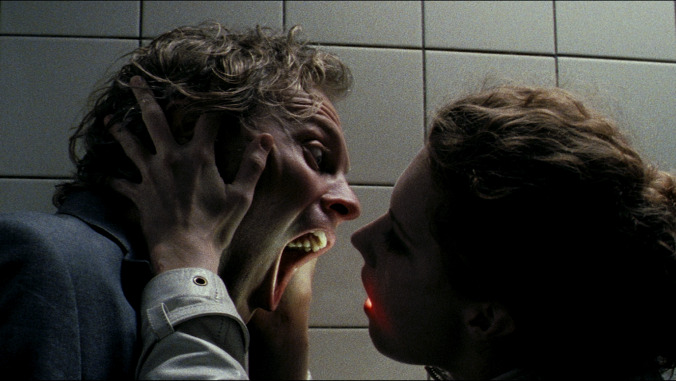Horror pastiches produced over the past decade or so have reliably huddled around the same set of nostalgia-friendly filmmakers, with a particular affection for colorful, commercial thrills in the style of John Carpenter. But while Carpenter is great—no one is disputing that—it’s also invigorating to see a filmmaker pay slavish tribute to a completely different set of influences. Just such a jolt awaits viewers of German director Tilman Singer’s debut feature Luz, a film-school thesis project enamored with the formal idiosyncrasies and creeping dread of movies like Andrzej Żuławski’s Possession or Lucio Fulci’s The Beyond. Like those films, Luz is more concerned with nightmare logic and worshipping the savage feminine than conventional narrative structure, drawing from experimental theater as well as avant-garde filmmaking to create a disturbingly visceral sense of disorientation. Put more plainly, it’s an offbeat film that’s aggressively not for everyone. But if it’s for you, it’ll really be for you.
The first third of the film unfolds in a series of deep, unbroken wide-angle tracking shots, accompanied by the low, vexing hum of fluorescent light bulbs illuminating the impersonal spaces of a wood-paneled office building and a half-empty cinderblock bar. Within these claustrophobic confines, Singer draws out twin narrative threads tied to two mysterious women. The first is Luz (Luana Velis), a cab driver with a backwards baseball cap and a busted lip muttering a blasphemous prayer in Spanish—“Our father, why are you such a dick? You see a girl and you reveal your true self. Thy kingdom stinks,” she mumbles—while seated on an uncomfortable plastic chair in a German police station. The second is Nora (Julia Riedler), a barfly in a squeaky leather jacket and smeared eye makeup whose flirtatious conversation with miserable, sodden psychiatrist Dr. Rossini (Jan Bluthardt) turns out to have a diabolical ulterior motive. Although they’ve long been separated, Luz and Nora are spiritually linked by an occult ritual they performed together back in boarding school. And the demon they conjured that day is still on the loose, hopping from body to body in search of its true love.
Eventually, these threads converge as Dr. Rossini is called into the office building to place Luz under hypnosis and question her about the events of the night before, when something criminal—it’s not clear what—occurred in the back seat of Luz’s cab. The interrogation scene takes up 40 minutes of this 70-minute film, a slow drift away from reality that disassociates entirely before coming back down to Earth for a killer denouement. As the scene progresses, Singer changes formal tacks from ominous long takes to off-kilter close-ups and surrealist cutting; he changes color palettes, too, from muted shades of gray to intense, Argento-esque jewel tones, both of which nicely complement the exaggerated grain of 16mm film. (It’s actual 16mm, too, not digital with a filter added in post).
But Singer’s most engrossing—and challenging—experiments in Luz are sonic in nature. Through the device of a translator’s earpiece, Singer layers dialogue in German and in Spanish, combining it with creatively applied sound effects and an atmospheric, synth-based score to both distance the viewer from and absorb them in the nudity and bloodshed. It’s a technique enhanced by the film’s mannered performances, for an overall effect that’s both haunting and unresolved. If the film confounds, that’s a marker of directorial success in its way—although Luz’s vision is bizarre, its strangeness is both cohesive and controlled. Packed with striking imagery, it’s the sort of film adventurous viewers live for: unapologetically weird and utterly fearless.
Note: This is an expanded version of the review The A.V. Club
ran from the Fantasia Film Festival.



 Keep scrolling for more great stories from The A.V. Club.
Keep scrolling for more great stories from The A.V. Club.